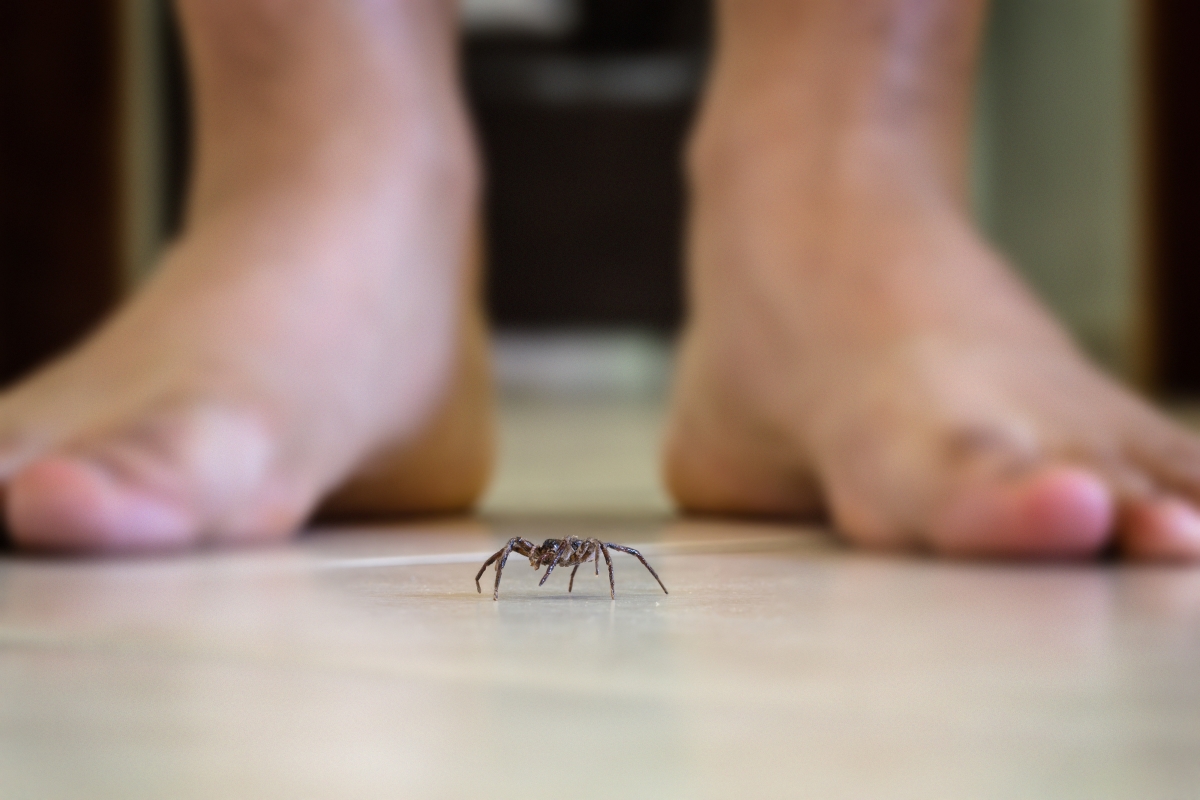

We may earn revenue from the products available on this page and participate in affiliate programs. Learn More ›
Most people know that spiders benefit our gardens by eating insects such as mosquitoes, flies, and ants. However, these free-range arachnids are much less desirable when they’re inside the home—and this happens much too often. You’re particularly likely to suddenly see lots of spiders in the house in the late summer and early fall, which is when they breed.
To learn how to get rid of spiders, it’s important to understand what attracted them to your home in the first place. As Tyler Hawkins, a regional field manager for Fox Pest Control, which has locations across the U.S., explains, “Spiders like to hide in areas that help them feel protected and also provide areas to build webs to catch food.” Eliminating these potential hiding spots and deploying natural and nonnatural deterrents are just a few ways to attain a spider-free home. Though arachnids are persistent pests, this guide can help you get rid of the spiders, save the cost of an exterminator, and focus on keeping spiders away long-term.
Tools & Materials
Bobvila.com may earn a commission from purchases made through these links.
- Yellow bug-repellent light bulbs
- Sodium vapor light bulbs
- Sticky traps
- Nontoxic spider insecticide
- Essential oils
How to Get Rid of Spiders in 6 Steps
As with other pests that enter our homes, getting rid of spiders is a multipronged process that involves eliminating eggs and adults, and then doing what we can to prevent them from returning. Follow these simple steps to get rid of spiders without using pesticides.
Step 1: Vacuum your home top to bottom.
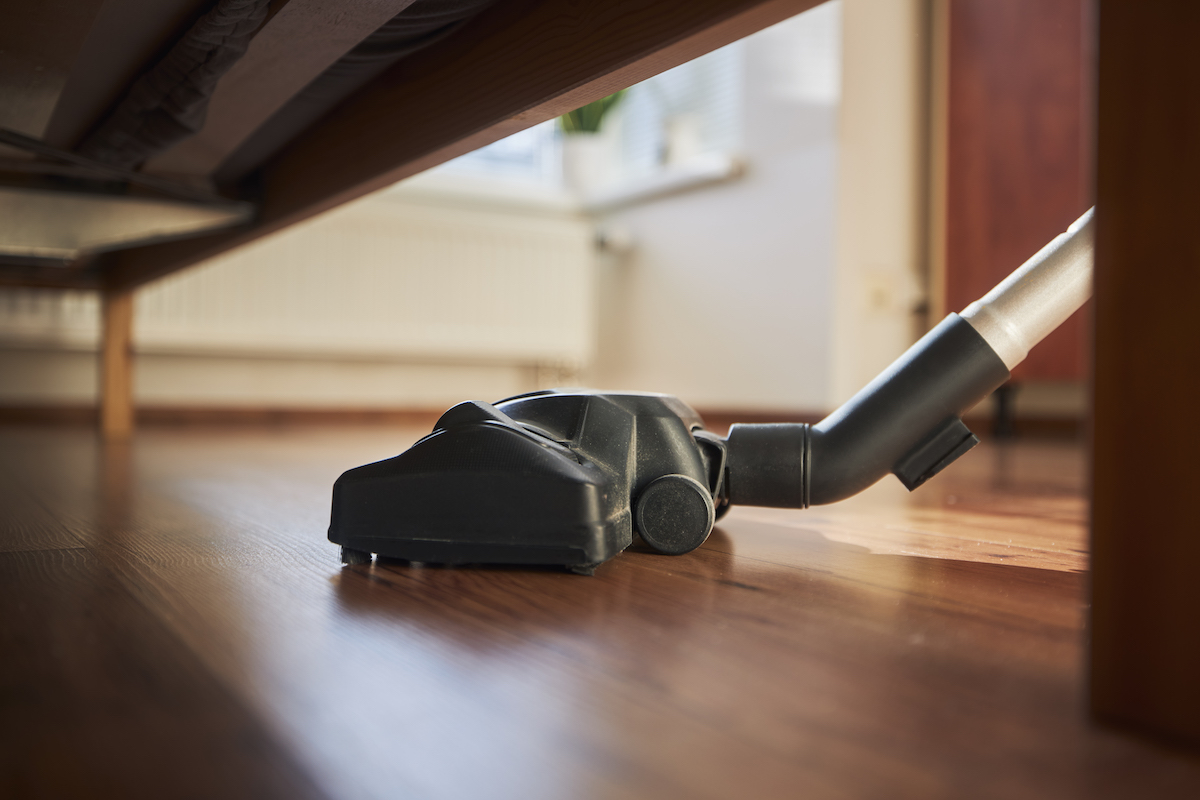
If you’ve spotted any spiders indoors, their egg sacs are likely lurking in the darkest crevices of your home. First things first: Vacuum the entire house top to bottom, including under the living room sofa and in the corners of closets.
“Spider egg sacs can have hundreds of spiderlings inside of them. By vacuuming the egg sacs, you prevent the egg sac from opening up and letting the spiderlings out inside your home.”
—Tyler Hawkins, regional field manager for Fox Pest Control
As you go, vacuum up any spider webs or spiders you come across and promptly dispose of the vacuum bag or canister contents in an outdoor garbage can. Physically removing spiders and their eggs is not the only way vacuuming can help with an infestation, Hawkins adds. “Vacuuming in general also helps in maintaining a clean environment that does not attract insects,” he explains. “By keeping things clean and decluttered, you prevent other insects from finding places to hide and find shelter. Spiders feed on other insects, so keeping your home free of insects will help against spiders too.”
Step 2: Make your home less inviting to arachnids.
Your next goal is to discourage spiders from entering your house in the first place. You already know that light attracts bugs, and it’s no different with spiders. Switch off some of your outdoor lighting, or swap out regular bulbs for yellow bug-repellent bulbs or sodium vapor lights. While you’re at it, declutter and clean the immediate perimeter of your home. Spiders are attracted to warmth and shelter, so things like leaf piles and firewood stacks are best kept away from the house.
Step 3: Use traps to identify possible areas of spider infestation.
Back inside, place sticky traps throughout your house. While these squares alone are not likely to eradicate the problem (in large part because they do not contain any pesticides), they are laced with a spider-luring aroma. By determining which traps end up with the most activity, you can identify which rooms are most vulnerable and proceed accordingly.
Step 4: Apply a nontoxic pesticide.
The next step is to address the problem area, or areas, with the spider pesticide of your choice. Nontoxic, natural pesticides are recommended, especially in homes with pets and children. No matter which product you select, expect to apply the solution more than once to get rid of spiders completely, as these pesticides work only upon direct contact. For maximum spider control, “Treat around the foundation, doors, and windows,” says Hawkins. “You can also treat other areas where spiders can be found or build their webs, such as eaves or corners of the garage.” When spraying for spiders, be sure to follow the manufacturer’s instructions closely to ensure safety and effectiveness.
Step 5: Make a homemade spider repellent.
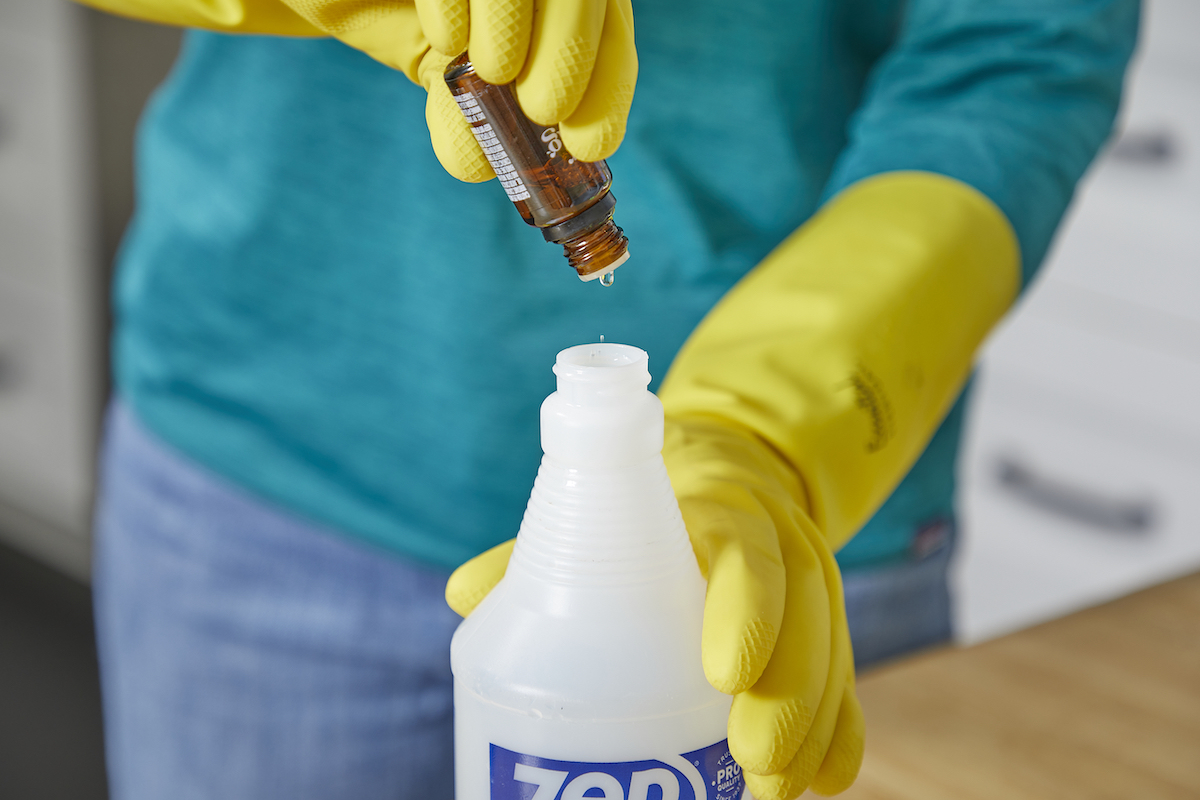
After applying a pesticide, follow up with a spider repellent. It’s easy to make your own insect repellent for spiders since many essential oils, including rosemary, lavender, and peppermint, are thought to be effective.
In a spray bottle, mix:
- 5 to 7 drops of essential oil
- 2 cups of water
- A drop of dish soap
Step 6: Seal all openings to prevent spiders’ reentry.
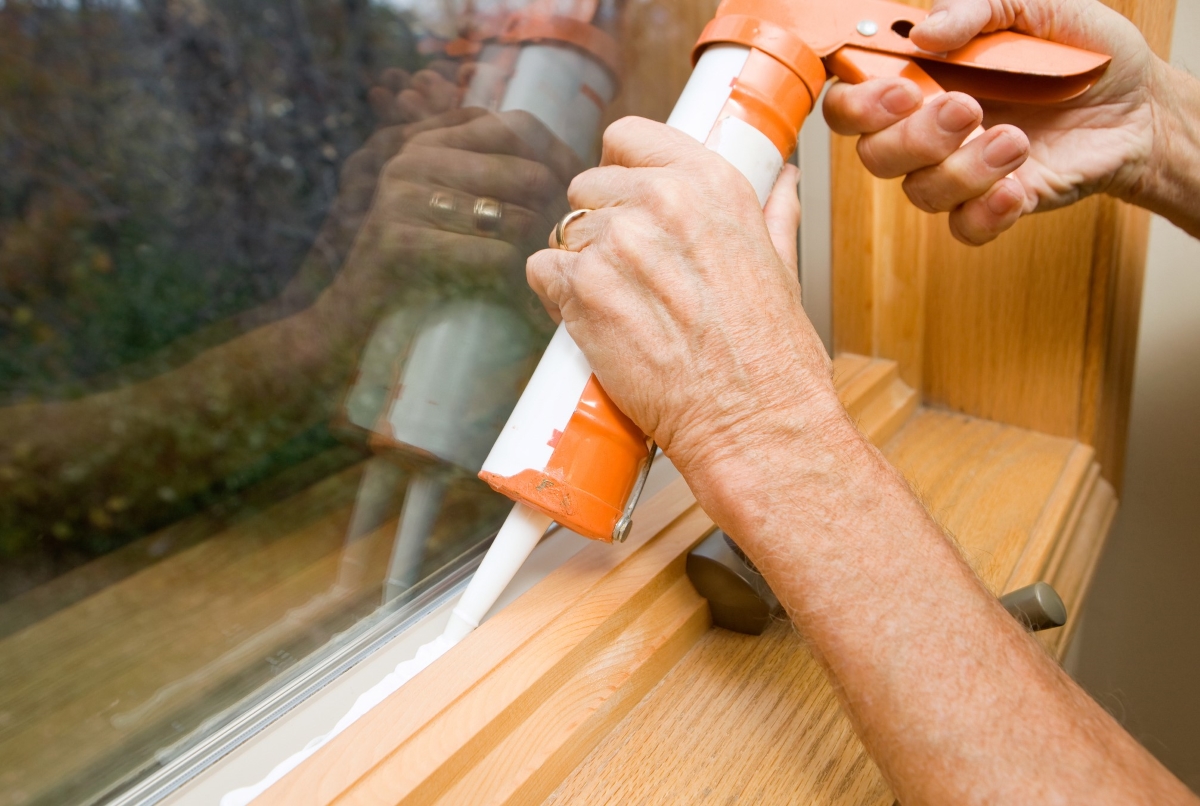
The final step (and the ultimate spider deterrent) is to seal all openings in your home, from cracks in the foundation to drafty windows. Because spiders can sneak through small holes, it’s by no means overkill to place mesh screens inside vents. Hawkins agrees: “Spiders as well as their spiderlings are able to easily fit through small gaps,” he says. “If any of the vents have large gaps, placing a screen mesh behind the vent cover can prevent spiders as well as other unwanted insects.”
As long as there’s a way for spiders to gain entry to the home, you can never truly consider the problem solved. The silver lining is that warding off spiders is one of many good reasons to seal your home, so the project is well worth the trouble and expense.
How to Keep Spiders Out of Your House
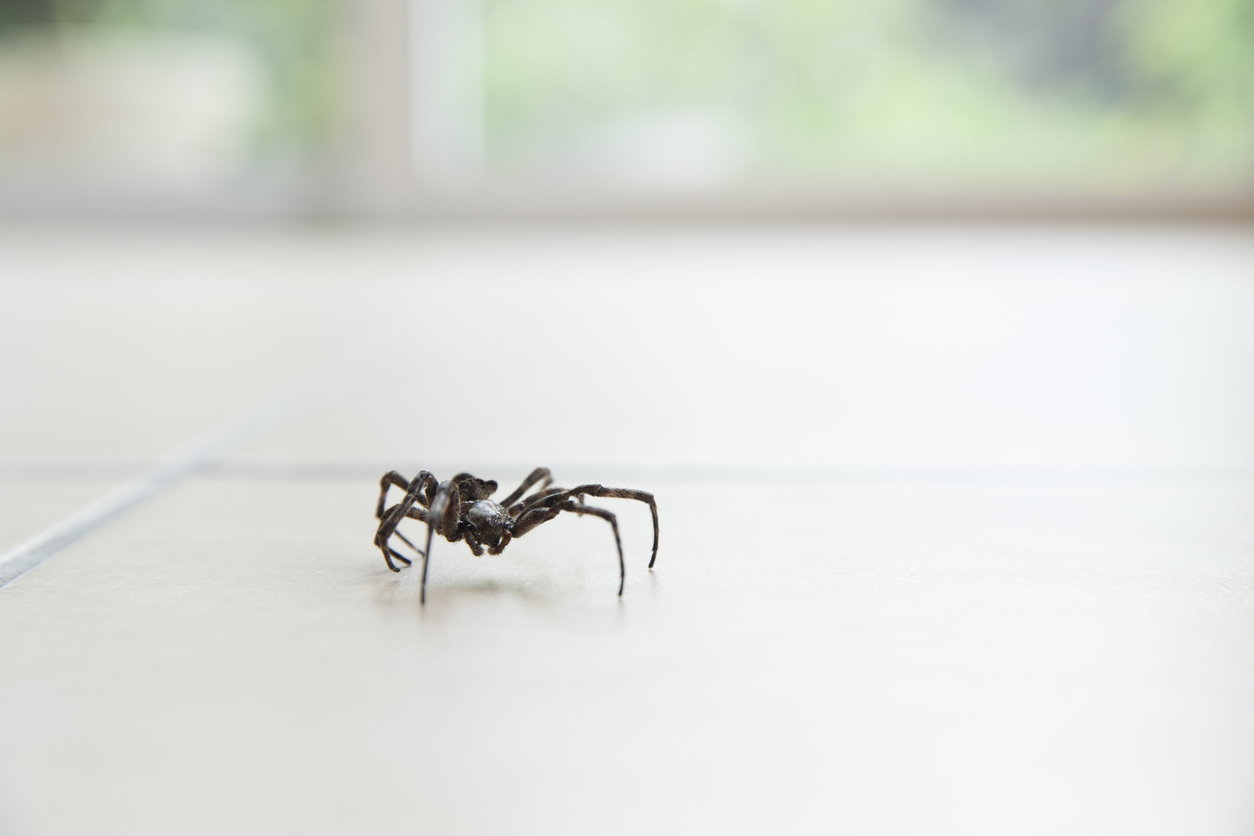
Now that you’ve identified what attracts spiders to your home, sealed potential points of entry, and applied indoor spider repellent, what else can you do to prevent indoor spider infestations? There are several other natural spider-repellent methods you can rely on:
- Dust and vacuum your home regularly.
- Treat and prevent indoor pests that spiders eat (flies, ants, mosquitoes, etc.).
- Take out the trash and recycling regularly.
- Store outdoor garbage cans and recycling bins away from windows and doors.
- Place fresh chestnuts on windowsills, along baseboards, and near exterior doors. (While chestnuts have been shown to deter some species of spiders, this may be an old wives’ tale. But it can’t hurt.)
- “Trim limbs, branches, and other vegetation away from the home to prevent them from touching the home. Spiders can use these as thoroughfares onto and eventually into your home,” says Hawkins.
FAQs
Relocate a single nonvenomous spider outdoors by carefully trapping it with a lidded container, sliding a piece of paper under the container, and releasing the spider away from your home. Alternatively, you can spray spiders with a 1:1 mixture of white vinegar and water, use an indoor insecticide spray, or squish a solitary spider with a tissue, paper towel, or solid object. For extensive infestations, consider hiring a spider exterminator.
A number of natural scents that humans generally find pleasing, including eucalyptus, citronella, lavender, peppermint, tea tree, cinnamon, citrus, cedar, marigold, horse chestnut, lemon, and vanilla, have been shown to repel some insects and may also be deterrents for spiders.
To make a natural spray for spiders, mix essential oils or extracts of any of the above scents with water or white vinegar in a spray bottle. Apply to areas where you have seen spiders as well as doorways, windows, and other places where spiders may find a way into your home.
Actually, spiders are not particularly attracted to your bed. They don’t like humans any more than we like them and are more likely to concentrate their energies on preying on light-attracted insects than carouse through the darkness of your sheets. If, however, you are partial to snacking in bed, you might want to rethink that habit because the crumbs could be attracting spiders’ prey (and thus, the spiders themselves).
A dead spider doesn’t attract other spiders, though the occasional arachnid may be drawn to the carcass as food, or snack on other bugs that show up to feast on the dead spider.
